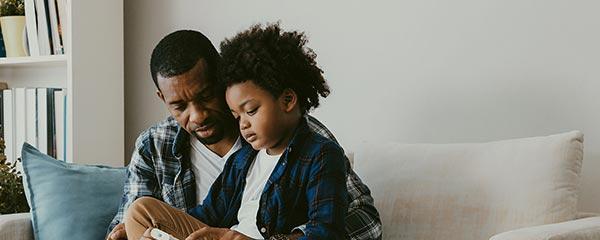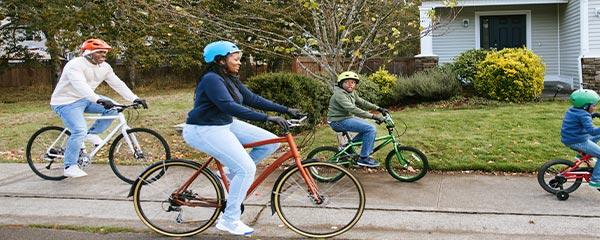WASHINGTON, D.C. -- Spending time together as a family is one of the hallmarks of the holiday season, and this time together may be healthy as well as fun: In recent years, major health organizations have published numerous reports about the benefits of shared family activities. It turns out that eating together, playing together, enjoying music together and other activities involving quality time spent together not only bring families together but also contribute to the physical and mental health of both children and parents.
A recent study conducted by and the ║┌┴¤═° Center on Black Voices finds that Black families who regularly engage in a wide range of shared activities report higher levels of wellbeing, happiness and tranquility in their lives.
This study was conducted as part of a larger research program intended to understand the lived experience of Black families with young children and to help researchers and practitioners support positive development for Black youth in the United States. To participate in this study, respondents were required to be a parent or guardian to at least one child under age 7. Respondents were asked to complete a survey about their lives and families once a month for four consecutive months; this article focuses on findings from 365 Black parents who completed the final monthly survey in September. Data from other months (June through August) are consistent with the findings reported here.
Black Families Spend Quality Time Together Every Week
Reports from Black parents with young children indicate that spending time together is a regular part of daily life. Virtually all Black families (97%) report engaging in at least one shared activity per week, and nearly seven in 10 Black parents report engaging in five or more shared activities weekly, if not more often.
The most common activity Black parents share with their children is eating together as a family. Nine in 10 Black parents report that they eat a meal as a family at least once a week, with 57% saying they do so most days each week.
Most Black parents also report engaging in activities that involve using creativity or imagination at least weekly, including dancing, singing or listening to music (86%); participating in creative play (76%); telling stories (70%); or making art (65%).
Taking part in cultural or family traditions is also common among Black families, with more than two-thirds (68%) making it at least a weekly occurrence. For some families, this may include religious activities. In fact, 40% of Black parents say they attend a faith-based service or activity with their young children once a week or more, and another 24% say they do so at least once or twice a month.
Higher-income Black families more frequently engage in certain shared activities. For example, parents with an annual household income of $60,000 or more are more likely than those in lower-income households to report creative play (85% vs. 75%, respectively), storytelling (80% vs. 65%), and dance, music or singing (90% vs. 82%) at least once a week. Patterns are similar based on educational attainment, with college-educated parents more likely to engage in these activities.
Black parents who are married or living with a romantic partner are also more likely than those who are not to report engaging in activities involving dance, music or singing (92% vs. 83%, respectively) or storytelling (77% vs. 59%).
There are no meaningful demographic differences in the frequency of other shared activities among Black families, such as engaging in cultural or family traditions, attending faith-based services or activities, or eating together as a family.
Shared Activities Are Valued in Black Families
Black parents report that the activities they share with their young children are important to them and their family. Eighty-three percent of Black parents rank music or singing as somewhat or very important. In fact, over half (55%) rate music as very important to them and their family -- the highest percentage seen among all of the activities asked about.
Black parents have similarly positive assessments of creative play: 80% rate it as somewhat (32%) or very important (48%). Strong majorities of Black parents also view storytelling (77%), dance (73%) and art (67%) as somewhat or very important. Three-quarters of Black families say other family or cultural activities are somewhat or very important to them.
Wellbeing Is Higher Among Parents Who Play and Share Traditions
Black parents who reported engaging in shared activities with their children at least once a week in September were more likely to have higher wellbeing that month. The same pattern was observed across all four months of the study.
Although attending faith-based services or activities is less common than other activities Black parents report sharing with their young children, those who do so at least weekly have the highest level of wellbeing: 56% are categorized as “thriving” in their overall wellbeing, based on their highly positive perceptions of their current life and optimism about their future.
Parents who spend time with their children each week eating meals, telling stories, playing creative games, dancing or singing, or sharing cultural or family traditions also exhibit a greater tendency to be thriving.
In addition to feeling more positive about their lives overall, Black parents who engage in shared activities with their young children at least once a week are more likely to feel happy, excited, grateful, and peaceful.
For example, 32% of parents who participated in creative play with their children at least once a week reported feeling tranquility (also described as calmness, peacefulness or serenity) often during the past month, compared with 14% of parents who did not participate in creative play as frequently. Reports of feeling happiness often are twice as high among parents who played creative games weekly with their children (44% vs. 22%, respectively).
This study does not determine whether parents truly gain wellbeing from sharing activities with their children or whether parents with high wellbeing are better able to prioritize engaging in these activities with their children. It is also possible that a third factor, such as having an optimistic outlook on life, relates to having both higher wellbeing and a greater willingness to participate in shared family activities.
Implications
The vast majority of Black parents regularly engage in multiple types of activities with their young children each week -- eating together, playing together, dancing or singing together, and creating art together. These activities are important to Black family life and are associated with higher wellbeing and positive emotions in parents.
Although people tend to engage in family activities when holidays approach or the days grow shorter, spending time together is important year-round. This study of Black families exemplifies that shared activities take many forms and may vary from day to day or family to family, but all serve the same purpose of bringing parents and children together.
Because the survey was limited to parents of Black children, it is not known how common these experiences are compared with families of other racial or ethnic backgrounds, or if the relationships between family activities and measures of wellbeing are stronger or weaker in other types of families.
To stay up to date with the latest ║┌┴¤═° ║┌┴¤═° insights and updates, follow us on X .
to receive email updates on ║┌┴¤═°'s latest insights and historical findings on the experiences of Black Americans. Access the latest from the ║┌┴¤═° Center on Black Voices.



